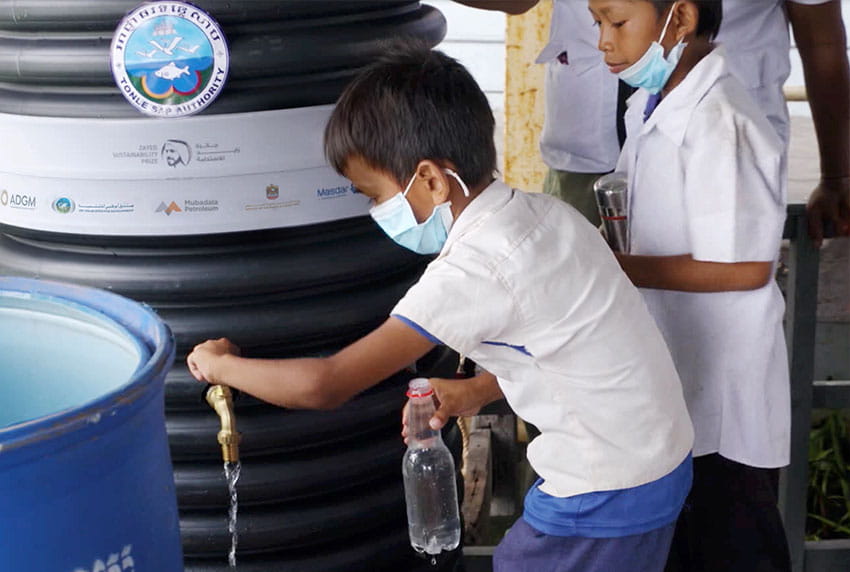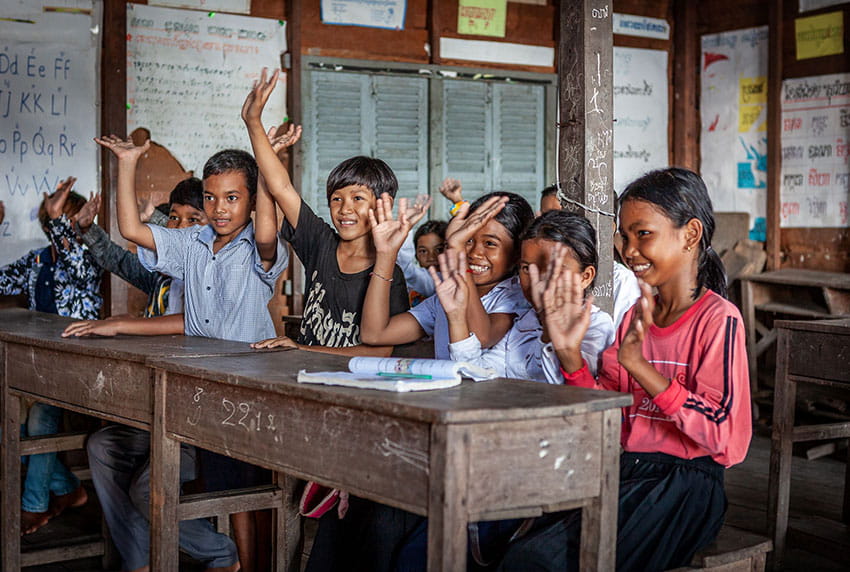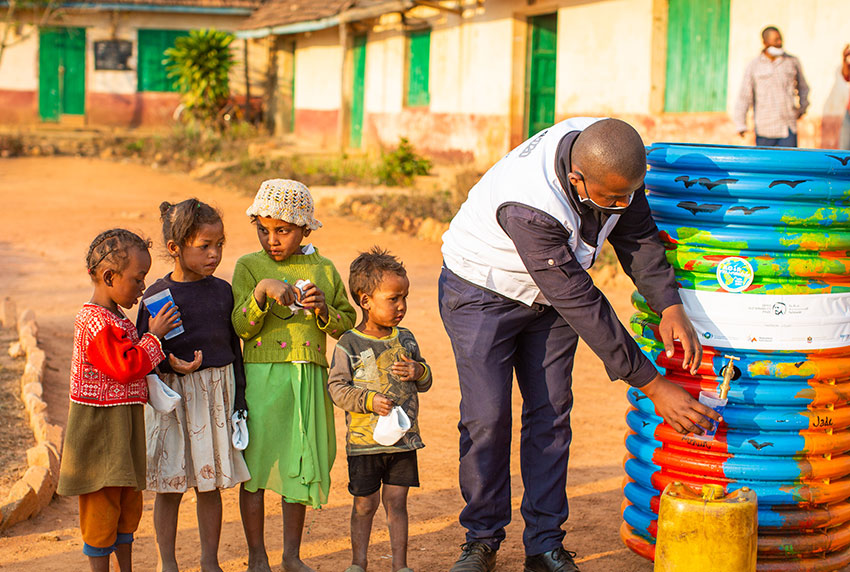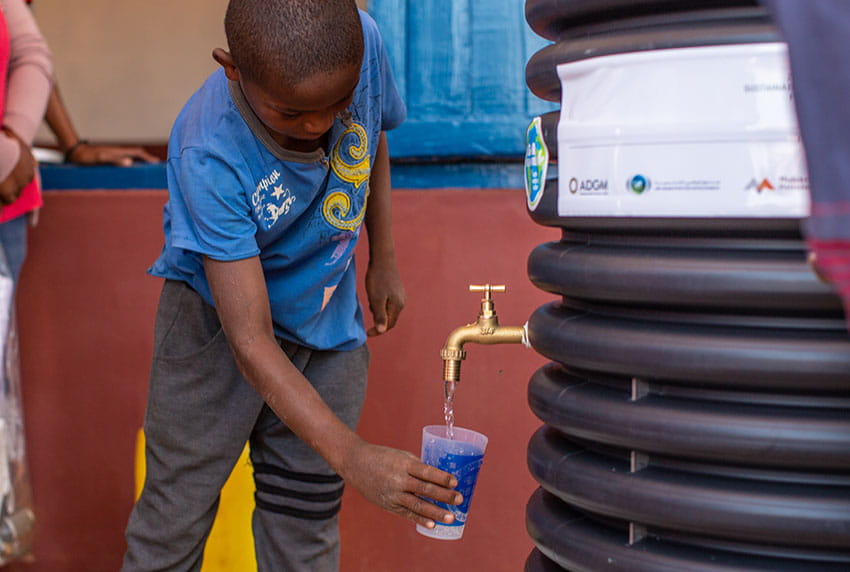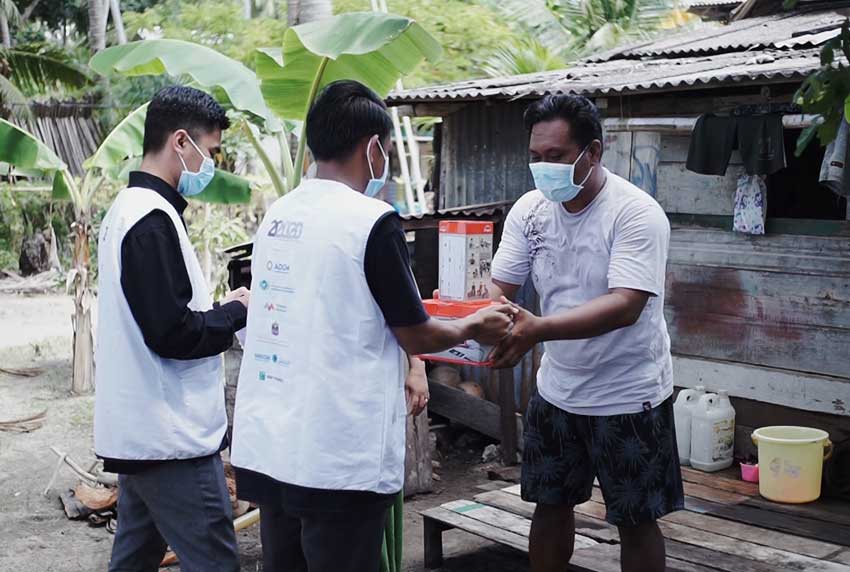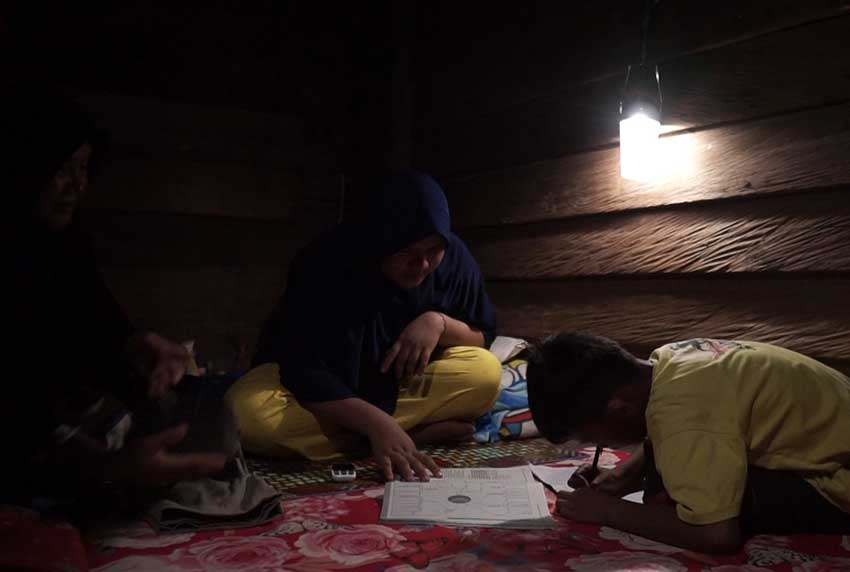Inspired by the legacy of the UAE’s founding father, the late Sheikh Zayed bin Sultan Al Nahyan, 20by2020 is a high-impact, UAE-driven initiative that champions his enduring sustainability and humanitarian values. 20by2020 oversees the donation of innovative solutions and technologies of previous Prize winners and finalists to vulnerable communities, addressing the world’s most pressing challenges and spanning the key sectors of health, food, energy, and water.
Led by the Prize, 20by2020 brings together a leading and growing roster of partners that include Abu Dhabi Global Market, Abu Dhabi Fund for Development, Mubadala Petroleum, the UAE Ministry of Tolerance and Coexistence, Masdar, and BNPP Paribas; the most recent partner to join the initiative and the first international private company. Majid Al Futtaim also joined the initiative in support of projects in Jordan and Egypt, earlier this year.
Cambodia: Delivering a vital source of clean water for villages, a school, and a clinic
Last October, the 20by2020 initiative paved the way for thousands of people across three Cambodian villages to live safer, healthier lives. This was a result of deploying a new water purifying technology by the Agir Ensemble Association, a France-based non-profit organisation and the 2019 Zayed Sustainability Prize finalist under the ‘Water’ category, which operates its technology under the brand name ‘Safe Water Cube’.
The initiative in Cambodia deployed five water fountains, benefiting the 4,400 residents of the Chhnok Trou, Kampong Phrah and Ses Salab villages.
Thanks to the water ultra-filtration solutions, the village communities, along with the Chhnok Trou school and clinic, have access to clean and safe water for the first time. Not only does this gives residents an option for avoiding many of the waterborne diseases and other health issues stemming from dirty water, it offers new opportunities for better hygiene, an essential requirement given the importance of handwashing in preventing the spread of coronavirus.
The Safe Water Cube fountain is a technological innovation that provides immediate access to drinking water through a fountain and its system by ultrafiltration of surface water and wells, removing all viruses and bacteria.
When a Safe Water Cube fountain is installed in a village, illnesses decrease considerably, and people's lives fundamentally change as access to clean water allows the entire population to be healthy and children to attend continuous and quality schooling. Adults can have an income-generating activity and women are often relieved of the chore of fetching water. Water consumption no longer endangers populations and improves health in the long-term.
San Sophy is a young 23-year old mother and is three months pregnant with another child.
She and her husband were both born on the Tonle Sap Lake in the floating dispensary of Doun Sdaeng. They have known no other life than on the water. One of the challenges that they have faced for years is the lack of clean drinking water. Sophy says,” My husband is a fisherman and I move around in the boat that we own to conduct daily household chores”.
The ongoing pandemic has adversely affected Sophy and many families like her. Unlike before, there are no tourists visiting the floating villages anymore. Selling indigenous handicrafts earned the family enough money to buy everyday essentials, including filtered water. With that source of livelihood gone, the family experienced and lived through financial difficulties, surviving only on her husband’s earnings.
“We did not even have enough money to buy 20-liter bottles of filtered water at 5,000 riels (equivalent to $1.25)”, explains Sophy.
“The only option we had in the last few months was to boil water from the lake or heat the container under sunlight to kill any bacteria. But these practices are not enough to purify water. The water still remained contaminated!”
Since the installation of the fountain at the local health clinic, Sophy now goes there frequently to get herself examined and to get drinking water for her entire family and neighbours.
She says delightedly, “I am so thankful to have access to this fountain as I was very worried about my unborn child's health from drinking lake water. Today, I don't get sick anymore and my stomach cramps have stopped.
Madagascar: Tackling the challenge of access to clean water in rural communities
Similar to the project in Cambodia, 20by2020 recently installed the same ‘Safe Water Cube’ fountains across five rural areas in Madagascar at the end of November with the aim of improving the quality of life for approximately 8,500 people in the East African nation on a daily basis. The beneficiaries also include 4,200 children between 4 and 16 years, segmented between students and their families.
The deployment is part of efforts to tackle the prevailing challenge of access to clean water in remote communities of Madagascar while supporting the local government’s drive towards enhancing the scope of water treatment solutions for rural communities in line with the Sustainable Development Goal related to water, sanitation and hygiene.
Four fountains were installed in schools including St. Joseph School in Antsirabe and schools in Vohitrarivo, Ambohijafy and Ambohijafy Talata Andraikiba that are also accessible to local village residents. In addition, a fountain was setup for the patients and healthcare workers at a hospital in Andraikiba.
In Madagascar, more than 58% of people lack access to safe drinking water and nearly half of all households live without sanitation facilities, according to international estimates.
Voahanginirina Raivomanana is a 42-year-old mother.
She accompanied her pregnant daughter to a local clinic as her son-in-law cannot afford a day off with his low wage salary.
It is the same story for all mothers-to-be in the rural municipality of Andraikiba - you must give birth either at a clinic or at home with a traditional midwife.
A relative of Voahanginirina says: “We chose to go to St Claire D‘Assise clinic in case of any complications since it is her first child. I did not want her to give birth at home “
“It is already hard enough for them to find a safe place to give birth, but wherever they would like to go, there is no reliable source of clean water.”
Voahanginirina had to bring boiled water from her own home to the clinic, not only for her family, but also for the healthcare personnel to use.
Since the installation of the water fountain by the 20by2020 initiative, anyone going to the clinic would now have access to clean water.
Voahanginirina says: “I was so relieved that we now have a fountain in the clinic. I was afraid the water I brought was not enough and I would have to buy bottled water which is too expensive for me.”
Indonesia: Two leading Zayed Sustainability Prize winners join hands to provide life changing energy solutions to fishing communities in Indonesia
Last December, the UAE-led humanitarian initiative, 20by2020, concluded the year by extending its sustainable solutions in Pulau Laut Selatan in South Kalimantan, Indonesia, providing more than 21,000 people from a large fishermen community with improved energy access through off-grid solar lighting.
Indonesia’s Central Bureau of Statistics reports that a majority of the islands in Kota Baru, South Kalimantan, are still lacking electricity, posing various socio-economic challenges and day-to-day risks to local communities.
Pulau Laut Selatan is located in the Kota Baru Regency, where a quarter of the population still live in the dark, and the majority of households earn their living by fishing. As part of the 20by2020 effort, 3,600 solar lanterns and 1,000 mobile-charging solar lanterns have been distributed to fishermen living without access to electricity to assist them and their families with household lighting and income generation, enabling greater economic activities by fishing early in the morning and at night.
Additionally, the lanterns will improve health conditions by replacing kerosene lamps, a basic indoor power source for most households in unelectrified areas, along with candles and diesel generators that can adversely affect people’s safety, the environment, and levels of productivity. Local health centers can now accommodate patients at night.
On the social level, the 20by2020 deployment is assisting with improving the communities’ social and physical wellbeing by lighting up households and public facilities. This is enabling local beneficiaries to conduct community-based activities at night, while also following COVID-19 protocols at village gatherings, and village sporting events.
Moreover, the clean energy solutions are improving the communities’ overall quality of life by allowing them to cook, shower and conduct other activities in the evening, and at least 3,300 children from various households can now study at night by using the solar lanterns.
The deployment in Indonesia is a unique collaboration between two leading Zayed Sustainability Prize winners. D.light is a 2013 Prize winner and a US-based global pioneer in delivering affordable solar-powered solutions for households and small businesses that have been commissioned to provide the technology for 20by2020. Kopernik, is an Indonesian-based non-profit organisation and the 2016 Zayed Sustainability Prize winner which specialises in sustainable energy, with a mandate to reduce poverty in last mile communities. Kopernik was in charge of implementing the project in the field.
Speaking about the impact of the new solar solutions in the local community, Syahr Ani, Head of West Laut Island Division at the Kotabaru Regency said: “As the government representative of the West Laut Island sub-district, I am very grateful for the assistance of these solar lights. Now, our communities can carry out activities at night, especially fishing, to fulfill their family's economical needs. Prior to the 20by2020 installation, the fishermen brought flashlights or lamps with kerosene, which cost more money. With the help of these clean lighting solutions, the overall expenses for our fisherman will definitely be reduced.”
Jahrani, a fisherman based in the Nelayan Teluk Kemuning village and a direct beneficiary of the 20by2020 initiative expressed: “I am very grateful for this solar light due to its usefulness when going out to the sea at night. Now I can see the trees drifting in the sea and can avoid them when fishing. The lights can also be charged simply by exposing them to the sun, making it easier when I am in the middle of the ocean.
Santalia, a resident and mother at the Lontar Timur village added: “The light helps my child study at various hours of the night. With this solution, reading, and doing homework are easier because this lamp can also provide enough lighting to support the current “school-from-home” situation during the pandemic.
In terms of enhanced safety in the impacted villages after the 20by2020 deployment, Mahmoud, a resident of Tapian Bala descried how him and his family are safer when conducting activities outside of the house in the evening. Mahmoud happily said that the light is so bright that it also makes it easier for him to do activities at night, such as attending to the garden or going outside the house to socilaise with the community.
To ensure the needs of the local community are met through the deployment, the two Prize winners worked closely with Aruna, a prominent Indonesian fisheries’ e-commerce platform that focuses on developing the coastal economy by creating a fair and transparent fisheries trade through technology innovation. All parties collaborated to conduct comprehensive village assessments prior to distributing the solar lanterns and torches to the communities.
Since its launch in December 2019, 20by2020 deployed technologies in 8 countries as part of its first phase, ranging from critical lighting solutions to improved access to water and sanitation. Phase 1 of the initiative has so far improved the lives of close to 110,000.
.svg?iar=0&hash=670E3638BC16C0DD69B262DD1184DEA8)

